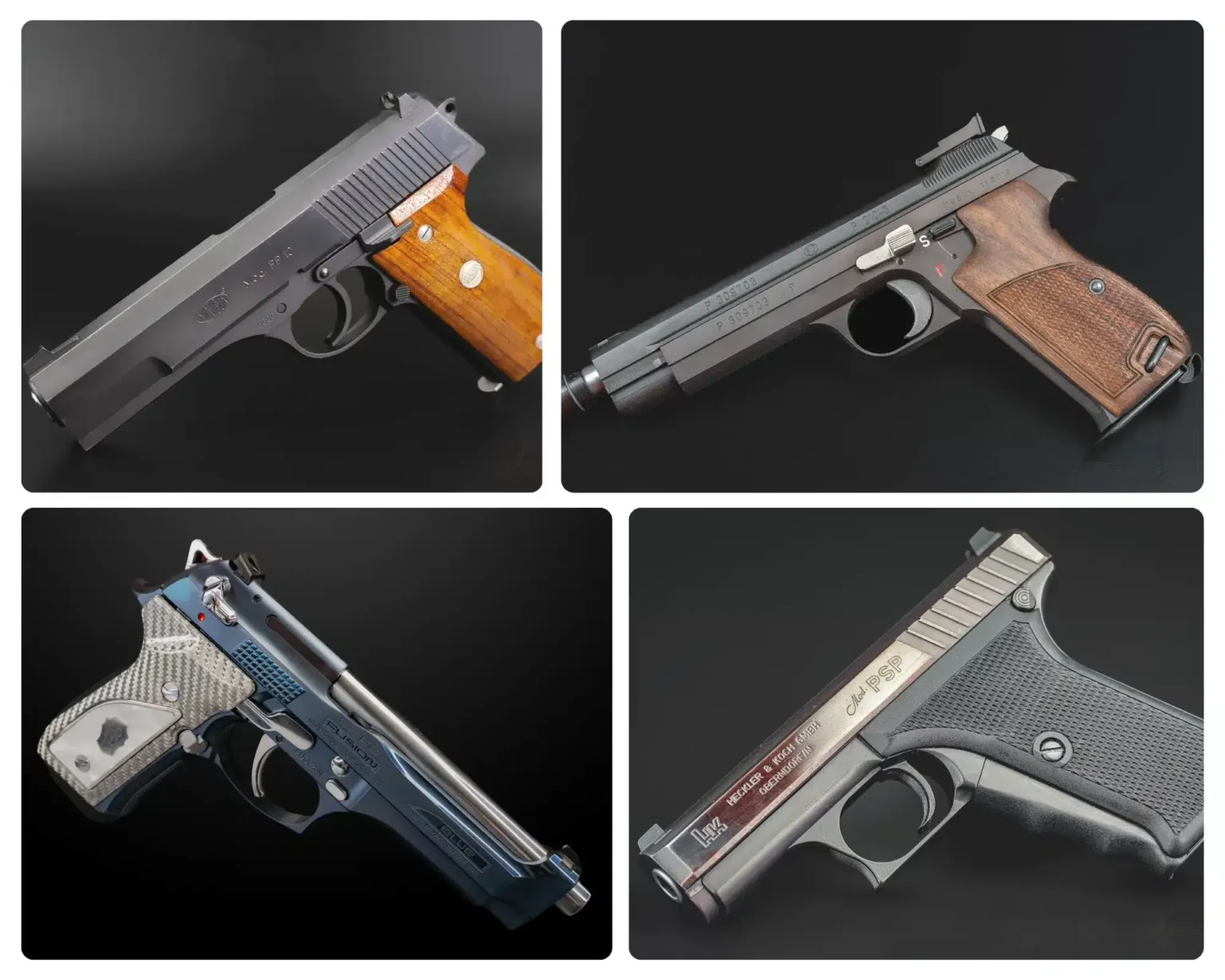The Allure of Firearm Collecting
The pursuit of firearm collecting is an intricate tapestry woven with threads of history, mechanical ingenuity, and artistic expression. This unique hobby captures the essence of human innovation and the perpetual quest for improvement, offering a tangible connection to pivotal moments and movements that have shaped the world.
Collectors of firearms often find themselves at the crossroads of being custodians of history and connoisseurs of technology. Whether driven by a lifelong passion for the mechanics and design of guns, the thrill of ownership, or the potential financial return, firearm collecting is more than a hobby; it is a window into the cultural and technological evolution of humanity.
Each piece in a collection tells a story of eras bygone, of wars fought, of security provided, and of frontiers explored. This guide aims to walk you through the hallmarks of iconic firearm brands, their unparalleled contributions to the craft, and the indelible legacy they have imprinted upon the annals of firearm history, making the realm of collecting these masterpieces a truly captivating experience.
Colt: A Legacy in Firearms History
In 1836, Samuel Colt laid the foundation of one of the most storied brands in firearms history. Colt’s manufacturing company revolutionized the firearm industry with the introduction of the revolving cylinder, and it was not long before Colt revolvers became synonymous with American resilience and pioneering.
The Single Action Army revolver, also known as the Peacemaker, became the quintessential symbol of the American West, famed for its reliability and widespread use by lawmen and outlaws alike. The Colt Walker, a collaboration between Samuel Colt and Captain Samuel Walker, was one of the most powerful handguns of its time. It was designed for the Texas Rangers and was instrumental in the Mexican-American War.
The M1911, perhaps Colt’s most enduring design, was the standard-issue sidearm for the U.S. Armed Forces for the better part of the 20th century, revered for its durability and reliability. The legacy of Colt’s innovation is evident in the company’s ability to adapt over centuries, with firearms that have become not just tools but icons, each carrying stories of a burgeoning nation and the inexorable march of progress.
Smith & Wesson: Precision Meets Heritage
Smith & Wesson’s inception in 1852 marked the beginning of a journey that would place the brand at the zenith of firearm innovation. Horace Smith and Daniel B. Wesson’s partnership brought forth breakthroughs such as the first American revolver to use rimfire cartridges and the development of the .44 Magnum caliber, which became a cultural icon in the world of firearms.
The Model 29 .44 Magnum revolver, immortalized by Clint Eastwood in the “Dirty Harry” films, became emblematic of raw power and the ultimate symbol of a cinematic hero’s authority. The Military & Police (M&P) series, spanning over a century, has become a staple in law enforcement and civilian markets, standing a testament to Smith & Wesson’s unwavering commitment to reliability, safety, and precision.
Each firearm in its lineage, from classic revolvers to modern semi-automatic pistols, showcases an enduring dedication to craftsmanship and innovation, cementing Smith & Wesson’s position as a paragon of American firearm heritage.
Luger: The German Marvel
The Luger pistol, with its distinctive silhouette and mechanical ingenuity, stands as a testament to Germany’s storied legacy in arms manufacturing. Originally developed by Georg Luger in 1898, it was the P08 model, adopted by the German Army in 1908, that cemented Luger’s legendary status.
Its iconic toggle-lock action was a marvel of engineering, providing a level of precision and reliability that was revolutionary for its time. The Luger’s sleek design and ergonomic grip made it not only a weapon of choice during both World Wars but also a highly coveted piece for collectors, symbolizing the technological advancements of the early 20th century.
Its use by various military forces, its cameo roles in countless war films, and its association with historical figures have all contributed to its mystique and desirability among collectors, making it an emblematic piece of military history and a must-have for those fascinated by the evolution of handgun design.
Ruger: The New Age Maestro
Ruger, established in the mid-20th century by William B. Ruger and Alexander McCormick Sturm, emerged as a fresh face in an industry replete with long-established names, quickly carving out its niche with a reputation for rugged, reliable firearms at an affordable price.
Ruger’s innovative approach to firearm design is exemplified by the Blackhawk revolver series, which combined the classic lines of single-action revolvers with modern engineering, and the 10/22 rifle, a semi-automatic rimfire rifle that became synonymous with versatility and customization.
The company’s commitment to consistent quality and customer service propelled it to become a household name among shooting enthusiasts. Ruger’s ability to blend traditional aesthetics with contemporary precision reflects the company’s understanding of a collector’s dual appreciation for historical significance and modern functionality, making its firearms a staple in any comprehensive collection.
Sig Sauer: Swiss Precision & Reliability
The origins of Sig Sauer trace back to 1853 in Switzerland, where it began as a wagon factory before transitioning to firearms production. This pivot heralded the birth of a brand synonymous with Swiss precision and reliability.
Sig Sauer’s legacy in crafting firearms that blend fine craftsmanship with unfailing performance is best exemplified by the P226 model, a pistol that earned the trust of one of the most elite military units in the world, the U.S. Navy SEALs. The selection of the P226 for such critical missions speaks volumes about Sig Sauer’s position at the pinnacle of firearm engineering.
The brand’s commitment to innovation is also evident in its continuous ergonomics, trigger systems, and modularity advancements, ensuring that Sig Sauer remains at the cutting edge of firearm technology and a revered name in the collector’s lexicon.
Heckler & Koch: Engineering the Future
Heckler & Koch, a post-World War II German venture, quickly established itself as a visionary in firearm design and technology. The company has been pioneering advancements in firearms since its inception, with a focus on developing weapons that are both innovative and robust.
The MP5 submachine gun, adopted by military and law enforcement agencies worldwide, is renowned for its reliability and versatility. The Universal Self-loading Pistol (USP) series further showcases H&K’s dedication to ergonomic design and customizability. Heckler & Koch’s forward-thinking approach to firearms is rooted in a philosophy of “No Compromise,” which ensures that every weapon they produce is of the highest standard in terms of functionality and durability.
The brand’s enduring commitment to excellence and its foresight in anticipating the needs of future combat scenarios has solidified its status as a pioneer in the field, with its firearms occupying a place of honor among collectors who value both history and innovation.
Holland & Holland: The British Majesty
Since its establishment in 1835, Holland & Holland has epitomized the pinnacle of British gunmaking, offering bespoke service that caters to the discerning sportsman and collector. Known for their exquisite shotguns and rifles, each piece from Holland & Holland results from countless hours of meticulous craftsmanship.
Renowned for their Royal side-by-side shotguns and the unrivaled precision of their bolt-action rifles, Holland & Holland’s offerings are as much a work of art as they are feats of engineering. Their guns have been the choice of royalty and elite sportsmen for generations, and the brand has become synonymous with the British countryside tradition of game shooting.
The allure of a Holland & Holland firearm lies not only in its flawless performance and classic beauty but also in the heritage and tradition it represents, making each gun a cherished heirloom and a tribute to the legacy of British luxury and sporting excellence.
Nighthawk Custom: The Rising Star of Collectibles
Nighthawk Custom, though a new player in the firearm industry with its establishment in 2004, has quickly risen to prominence with its dedication to producing handguns of the highest caliber.
By adopting the ‘one gun, one gunsmith’ philosophy, Nighthawk ensures that each firearm is a singular masterpiece, reflecting the pinnacle of custom craftsmanship. Their commitment to perfection in every aspect, from the smoothness of the action to the precision of the fit and finish, sets a Nighthawk Custom firearm apart in a collector’s cabinet.
As bespoke pieces, Nighthawk guns offer a modern take on collectibility, promising not only an investment in precision but also in exclusivity and individuality, making each firearm a personal statement and a functional piece of art.
Korth: German Precision Reimagined
Korth, founded in 1954 by Willi Korth, a German police officer, has established itself as a manufacturer of revolvers and pistols that transcend conventional standards. Korth firearms are distinguished by their exceptional quality, where no compromise is made on materials or workmanship.
Known for their intricate mechanisms and extraordinary accuracy, Korth guns are often seen as the Rolls-Royce of revolvers, combining the precision of German engineering with an artisanal approach to gunsmithing.
Each Korth firearm is a confluence of functionality, luxury, and exclusivity, appealing to those who seek the zenith of performance and sophistication in their collections.
Korriphila: The Hidden Gem
Korriphila, while not as widely recognized as some of the giants in the industry, produces handcrafted pistols that are paragons of firearm elegance and performance.
Their pistols result from a perfect blend of traditional craftsmanship and modern precision engineering. Collectors who discover Korriphila are often drawn to the brand’s dedication to excellence and the exclusivity that comes with owning one of their finely tuned instruments.
Each Korriphila pistol, with its flawless finish and mechanical perfection, is not just a firearm but a statement of individuality and a treasure among connoisseurs.
Browning: The Innovator’s Odyssey
The name John Moses Browning is synonymous with the genesis of modern firearms. His inventive genius revolutionized the industry with designs that were far ahead of their time. Browning’s contributions, such as the Auto-5, the first successful semi-automatic shotgun, and the Browning Hi-Power, one of history’s most widely used military pistols, have left an indelible mark on firearm technology.
The company that bears his name, Browning Arms Company, continues his legacy of innovation, creating firearms that are celebrated for their reliability, performance, and timeless designs.
Browning’s pioneering spirit lives on in their firearms, making them a cornerstone of any firearm collection and a link to the genius of one of the greatest firearms designers the world has ever known.
Beretta: Europe’s Ancient Firearm Maestro
Beretta, with a lineage dating back to 1526, stands as the oldest active firearms manufacturer in the world. This Italian company has forged its reputation over centuries, combining traditional gunsmithing with modern advancements to create firearms that are both works of art and marvels of technology.
The 92FS pistol, adopted by various military forces and law enforcement agencies, symbolizes Beretta’s commitment to excellence.
Beretta’s longevity is a testament to its ability to adapt and innovate, ensuring that its firearms remain relevant and sought after by collectors and shooters, bridging the gap between ancient artisanship and contemporary precision.
Walther: A Legacy of German Engineering
Walther has been a name associated with groundbreaking advancements in firearms design since Carl Walther founded the company in 1886.
Known for iconic pistols like the PPK and famed for its association with James Bond, Walther has consistently pushed the boundaries of firearm ergonomics and functionality. The PPQ series, with its superior trigger system and ergonomic design, continues this tradition, providing shooters with a level of performance that is distinctly Walther.
A Walther firearm does not merely represent a piece of machinery. Still, it embodies a lineage of innovation and a dedication to the craft that has endured through the ages, making it a prized asset for any collector.
Springfield Armory: Crafting American Firearm Heritage
The Springfield Armory, founded initially as a cache for revolutionary arms in 1777, has played a pivotal role in shaping American military history. As the primary center for manufacturing U.S. military firearms for nearly two centuries, it has produced armaments that have been integral to the nation’s defense.
Today, the commercial company that has carried on the Springfield Armory name continues to honor this storied past by creating firearms that embody the spirit of American ingenuity and resilience.
With a product line that ranges from the revered M1A, a civilian version of the legendary M14 rifle, to the innovative XD series of pistols, Springfield Armory’s modern incarnations uphold a legacy that is deeply woven into the fabric of American history and culture.
In the World of Luxus Capital & Collecting
The realm of high-end firearm collecting is marked by entities such as Luxus Capital, a paragon of discernment and investment in the field. With a portfolio that includes connections to prestigious brands like The House of Mueller Murgenthal and Korriphila, Luxus Capital exemplifies the pinnacle of luxury and connoisseurship in firearms.
Their commitment to acquiring and preserving museum-grade collections speaks to a deeper understanding of the cultural and historical significance of these pieces. For those who aspire to the upper echelons of firearm collecting, an association with Luxus Capital is not just about acquiring rare and valuable items; it is an entry into a world where each firearm is a masterpiece, a piece of history, and a work of art.
The collectors and enthusiasts who navigate this space are driven by a passion that transcends the mere ownership of firearms, striving to curate collections that represent the zenith of craftsmanship and legacy.
Conclusion: The Timeless Charm of Firearm Collecting
The art of collecting firearms is a testament to the human spirit’s dedication to artistry, precision, and historical preservation. This passion transcends the ages, connecting collectors to the legacies of craftsmanship and the milestones of innovation that firearms represent.
Each gun in a collector’s arsenal is not just a tool or a weapon; it is a narrative, a piece of history, a marvel of engineering, and a work of art that stands as a testament to the remarkable ingenuity of its creators. Collectors are not just acquiring pieces of metal and wood; they are embracing a journey through time, capturing the essence of the periods in which these firearms were made and the stories they tell.
The timeless charm of firearm collecting lies in this connection, in how these pieces resonate with the collector’s own story, and in their enduring legacy. It is a world where beauty and functionality intertwine, history is honored, innovation is celebrated, and each piece, no matter how small, plays a part in the grand tapestry of the firearm narrative.



